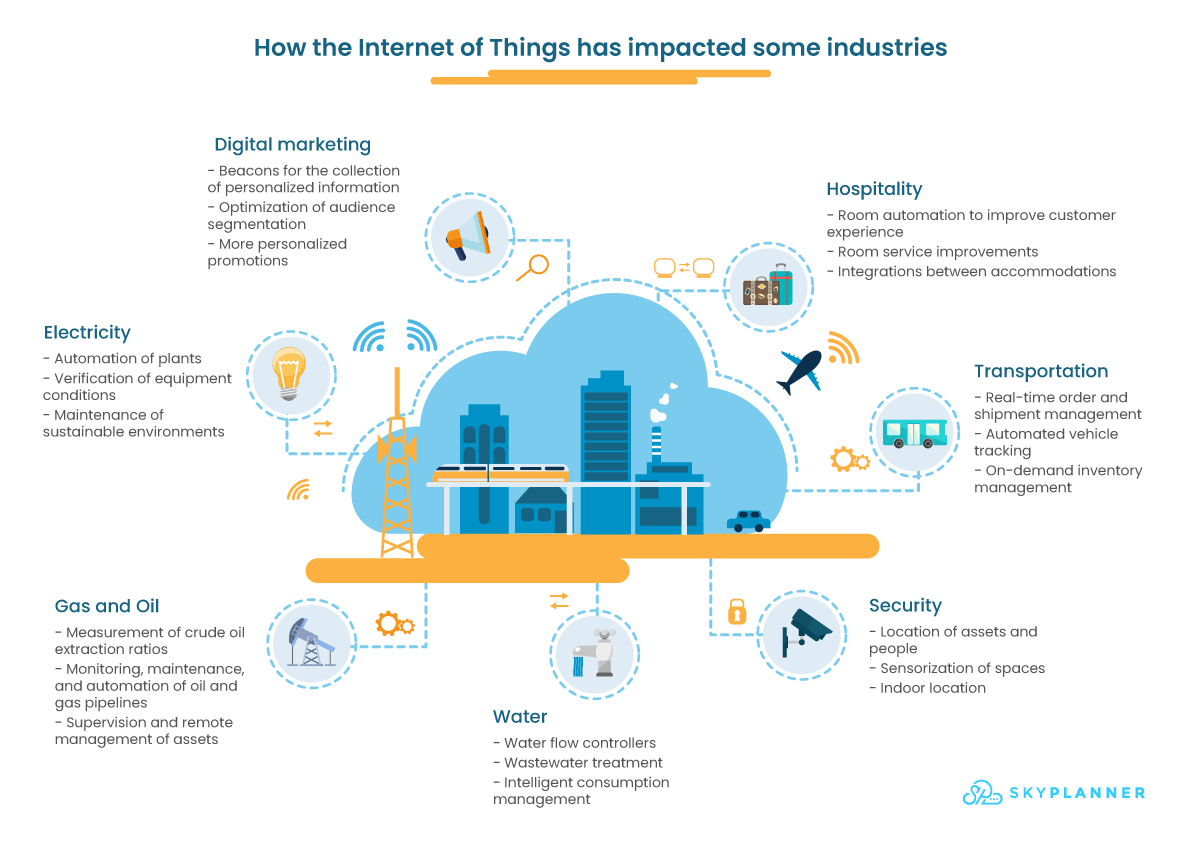Communication and connectivity play an important role in today’s business world. Together, they have succeeded in reshaping commercial and industrial flows. At the same time, it is increasingly sought after to connect the objects of daily life with people. According to Gartner, Inc., there were an estimated 26 billion devices connected to networks by the beginning of 2020. This data reflects a very close reality that everything that can connect, will be connected, and companies must know how to take advantage of this new scenario.
The Internet of Things
The Internet of Things, or IoT, is the system of interrelated computing devices integrated in everyday objects or “things”. It is known to have the ability to transfer data through a network without requiring human interaction. In other words, these are devices with the ability to communicate with each other and with humans. The IoT connects devices to the Internet in order to assign them new tasks. For example, they are able to control smart items remotely or receive alerts and status updates.
The term was coined in 1999 by Kevin Ashton, a researcher at the Massachusetts Institute of Technology (MIT). In his article, “That ‘Internet of Things’ Thing,” he states that people’s lack of time generates the need to connect to the network of networks in other ways. For this reason, the creation of devices that can perform human functions was proposed, bringing the physical world closer to the digital one. The first thing on the Internet was a Coke machine inside Carnegie Mellon University in the early 1980s. Programmers could connect to the machine and thus check the availability of cold drinks it presented. They would use this information to decide whether to make the trip or not.
However, this example seems somewhat rustic for today’s pretensions: smart homes, vehicles, appliances, and other objects that are now connected offer endless opportunities to the modern business world and its evolution. In this context, it is called the Industrial Internet of Things (IIoT- Industrial Internet of Things). This is the set of connected devices that form systems capable of monitoring, collecting, exchanging, and analyzing data while delivering valuable information that allows a company to make operational and/or commercial decisions in a more agile and precise.
How has Internet of Things impacted business
The expansion of the Internet of Things opens up new windows of action for the business world, as well as challenges. The extreme digitization of the physical world will develop a direct and intimate connection between users and brands. The myriad of sensors connected to almost any device becomes an infinite sea of data; much bigger than the Big Data that we have at our disposal today. Therefore, AI tools are key to staying afloat. Decisions made automatically will get things done at breakneck speeds, and businesses must keep up. All this must be taken into account by companies so that they can survive and reposition themselves.

However, what is the real impact of the Internet of Things on a business? Among the main beneficial changes occurring today are the following:
- Inventory management: Warehouse inventory can be a headache if you are understaffed or have low-skilled staff, even if it requires the storage of multiple supplies. Well, IoT solutions allow you to track and manage the warehouse through sensors, devices, and software, offering the option of being controlled automatically. This offers more peace of mind for owners, a more optimal flow between warehouse and business, and more time for staff to take care of other operations.
- Data sharing and perception: With more connected devices, the volume of data collected will be even higher. This will allow businesses to better understand their clients and the market in which they operate. It will also provide them with information about their employees, competitors, and the company itself, facilitating business decision making.
- Optimization of customer relationships: The IoT completely changes how these relationships are managed by allowing closer access to customer data: detailed metrics, behavior patterns, requirements, purchase cycles, etc.
- Optimization of marketing strategies: Thanks to the informative beacons and the large volume of information they offer, marketing professionals are able to propose individualized strategies based on people’s day-to-day lives; taking into account their habits, the places they frequently visit, and the activities on their calendars.
- Productivity and efficiency: With better reports on customers, the market, employees, and the operation of the company while making better business decisions, the productivity of any business can be dramatically increased. The implementation of IoT solutions also saves considerable time since the software and devices allow complex tasks to be carried out more quickly.
- Remote work: IoT technology makes it possible to consolidate remote work as an attractive alternative for many people. Employees can connect with others and establish more flexible and productive workflows. Managing physical inventory can be made easy and in a few years with a smartphone or tablet and an internet connection. You may be able to manage an entire production line.

Salesforce Internet of Things Services
Salesforce IoT Cloud is a powerful solution that allows you to connect data obtained from IoT devices with customer information in real time. Learn how to take advantage of these services in your company.
These are just some of the many beneficial transformations that the Internet of Things could bring to your company. If it were thought as part of a more radical digitization strategy, it could be combined with other technologies such as Artificial Intelligence, Robotics, Blockchain, and others; unlocking new commercial opportunities and previously unexplored forms of income, new added values, and more competitive products and services for businesses.
